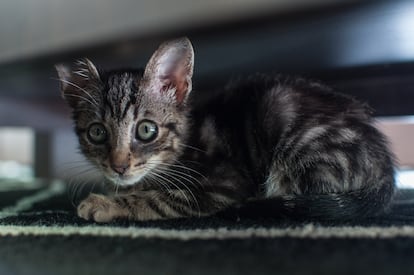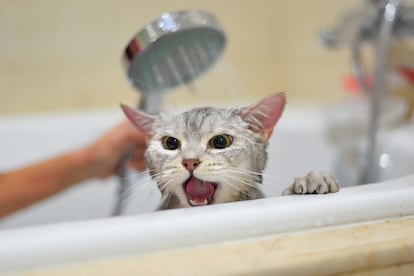What are cats afraid of? From changes in the environment to children


Those who live with cats know that they are animals that are easily frightened. An unexpected noise or even a new piece of furniture in the house can cause anxiety in the animal. Cats are not fond of surprises. As territorial animals that they are, they prefer to have everything under control. Their double role as predator and prey also arouses extra fears in them, because they are always alert, both to avoid being hunted and to detect their possible prey. In addition, it must be taken into account that their domestic side does not have as much experience as in the case of dogs, so certain experiences of civilization still disconcert and frighten them.
“Their behaviour as wild animals has led them to develop a great sensitivity to possible dangers. They tend to fear, above all, situations that they perceive as threats to their safety and survival,” explains João Pedro Monteiro, professor of animal behaviour at the Centre for Special Education in Health Sciences (Portugal) and veterinarian at Grupo Bom Jesus. “Among the most common fears are loud and sudden noises, such as firecrackers , vacuum cleaners, storms, as well as sudden movements or social stimuli, for example meeting unknown people or animals,” adds Monteiro.
Cats have a stronger sense of hearing than humans. What may seem like a tolerable volume to humans can be uncomfortable and frightening to them. “Loud or surprising noises are the things that scare them the most. Their sense of hearing is one of the most developed,” says Stefania Pineda, a specialist in animal behaviour medicine and professor at the Department of Animal Production at the Complutense University of Madrid.
Do all cats have the same fears? “Each animal is unique and their fears usually vary considerably. Although felines have some in common, such as sudden changes in their usual environment. But each cat’s reactions depend on multiple factors, such as their genetics, socialization and previous experiences,” explains Monteiro. “They tend to be reserved and reluctant to socialize, which is why they can be evasive when visitors come to the house. They have a hard time adapting to a new situation outside of their usual routine,” adds Pineda.

This specialist also emphasizes the influence of the animal's socialization process on whether it is more or less fearful. "When it has been with its mother and the rest of its litter for a sufficient amount of time (at least until 16 weeks of age) and has not had traumatic experiences of abandonment or abuse , the cat is more secure and less fearful," she says. In addition to adequate socialization from puppies, the appearance of fears can also be prevented through progressive familiarization with certain stimuli: "Such as noises, the presence of unknown people or other animals. It is also key to create a safe and stable environment, as well as avoiding punishment," explains Monteiro. "They like routine and it calms them because they are animals of habit that maintain their memories as predators and need to know their environment well to quickly detect any danger. For this reason, they are worried about sudden changes, such as trips or the arrival of a new animal at home, since it breaks their sense of control of their territory and generates stress and insecurity," continues the expert.
Cats and their fear of waterThe belief that cats don't like water is a classic one. But how much truth is there in this? Some large wild cats, such as the tiger or the jaguar, are great swimmers who do very well in the aquatic environment. On a smaller scale, domestic cats can show tolerance if they are accustomed to it from kittens. “It depends on their previous experiences, but some may show rejection, although some like it,” explains the specialist. “It makes them feel vulnerable because with wet fur they can't move as well and they feel strange. They are also scared of the noise of the water and the temperature (too cold or hot), as well as the fact of not feeling stable on the sliding surface of the bathtub,” Pineda clarifies.

No animal likes going to the vet , but cats get particularly stressed. So much so that some clinics have specialised solely in their care and take into account aspects such as smell, layout of the space, lack of loud sounds or the absence of other animals, such as dogs, in their facilities. “For a cat, a clinic is a hostile terrain that generates a lot of anxiety. It smells the pheromones of many animals that have been on alert, which creates uncertainty and fear. Things get complicated when they have to be transported in a carrier, because they dislike feeling confined,” adds the specialist. There are cats that are afraid of being abandoned and suffer separation anxiety when their owners leave the house. “This is the case of those that have suffered trauma due to having been abandoned and have been through shelters,” says the veterinarian. She also mentions the fear of children: “It is because, usually, they move a lot, make noise and invade their space, because they want to play with them roughly.”
EL PAÍS






